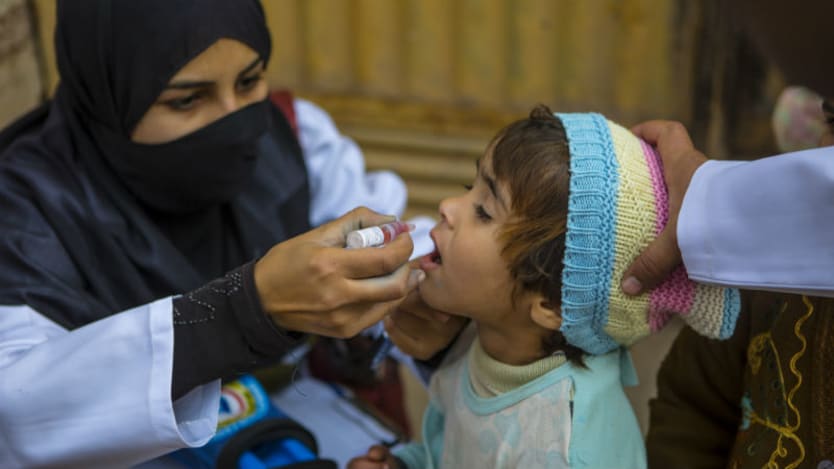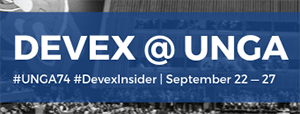Opinion: Health care providers risk their lives for others. How can we care for them?

Polio may sometimes seem like a relic of the past. For the most part, this is true through the Herculean efforts of frontline health workers and a successful global vaccination program. Sadly though, external factors — whether political, economic, or societal — can set back the incredible work that frontline health workers deliver. The latest government figures from Pakistan are a case in point, revealing that the country has seen 45 cases of the disease this year, the highest number since 2015.
Propaganda has hindered the fight against preventable diseases. We have seen its impact in Pakistan where, five years ago, it looked like polio was on the verge of being wiped out but pervasive misinformation about immunization has tragically allowed the virus to regain momentum. It’s a cruel irony that parents, who desperately want to protect their children, listened to fake reports and, inadvertently, placed their children in harm’s way.

Activism. UHC. Climate. Read more of Devex's coverage from the 74th U.N. General Assembly.
Frontline health workers therefore have an even bigger role to play in securing trust from local communities. Not only do they help to treat and prevent diseases, they also work tirelessly to win hearts and minds. The global health and development community must work together to equip these workers with the funds, protection, and tools they need; if we are to finally put diseases like polio to the sword for good.
The fact that the number of human-transmitted diseases has risen significantly since 1980 despite immense scientific progress made in medical prevention and care is concerning. With each child missing out on vital vaccinations, the world will fall short on meeting the Sustainable Development Goals by 2030. The statistics are alarming — the World Health Organization estimates a shortfall of 18 million health workers by 2030, mostly affecting low- and middle-income countries, where the concentration of illness is often the highest.
Health workers are not only exposed to risks in being in close contact with infection and disease, but they can also become entangled in political conflicts and even civil wars. This past April, a polio vaccinator was shot and killed in Pakistan, under a belief that vaccines are part of a western plot to sterilize Muslim children.
That same week, two police officers, protecting vaccinators, were shot and killed as well. Sadly, these are not isolated incidents. Investigative and global health journalists regularly report on attacks on health workers and medical clinics. Last year, attacks on health facilities killed or injured over 900 health workers providing medical care in conflict areas.
Propaganda has hindered the fight against preventable diseases.
—Despite these very real dangers, health workers continue to work tirelessly to prevent and treat diseases worldwide. The UAE Pakistan Assistance Program provides invaluable support to Pakistan across several key areas, including education and infrastructure.
The UAE launched the Emirates Polio Campaign specifically to tackle polio, and the latest figures have shown that more than 71 million Pakistani children have been vaccinated against polio as part of the campaign that began five years ago. With a successful campaign — just eight cases were reported in the first 10 months of 2018, down from 306 cases of polio reported in 2014. The logistics associated with a health campaign of this type are staggering and highlight the vital need for partners around the world to continue investing in disease elimination.
Ensuring global health security measures will require a huge amount of political will and financial investment to adequately equip and protect health workers, so they can deliver the highest quality care. This work cannot be done by one body and relies on international cooperation across public-private sectors.
For instance, the Emirates Polio Campaign is being carried out in cooperation with the Pakistan Army, which helps to ensure the stability of the program as well as preserving the safety of frontline health workers; UNICEF; WHO; National Institute of Health Islamabad Pakistan; ministries of health of provincial governments; and the Bill & Melinda Gates Foundation.
The situation around polio is far from unique though and frontline health workers continue to be our first line of defense. It was only five years ago when thousands of people were affected by the largest and most severe Ebola epidemic in history. With over 28,600 cases of Ebola reported across Guinea, Liberia and Sierra Leone. Doctors, nurses, and technicians were called to treat, rescue, and protect those affected and risked their lives to rescue others, becoming the first line of defense for the entire human population.
“The global health community and frontline workers tackle diseases around the world, but this work can rapidly be undone if momentum stops even for a minute.”
—I am encouraged to see that WHO continues to support health care workers, and the most recent political declaration on human resources for health identifies the vital role of the global health workforce. But those commitments are only as impactful as the actions they inspire. Public-private partnerships and the use of innovative financing mechanisms will be increasingly important to support health care systems and strengthen the frontline.
I have had the privilege of working alongside some of the most dedicated doctors, nurses, and technicians in the world, during my time on the frontline in Pakistan. One of the key lessons that I learned along the way is the importance of working within communities and driving change from the inside. This is the only way of really tackling misinformation and gaining the trust of parents and elders.
We must take cultural and social nuance into account and use innovative ways to gain access and establish trust. It’s heartening to see that this approach is yielding results. For instance, look at northern Nigeria, where traditionally, only women are allowed into homes due to purdah — the practice of seclusion. The health community there understands this and now 80% of the house-to-house vaccinators are female, to better work with community leaders to combat disease outbreaks.
The Reaching the Last Mile Forum in Abu Dhabi this November is one of the few events that brings global health experts and health workers delivering lifesaving support, together to discuss key issues. The theme of this year’s forum is “Accelerating the Pace” and the event will focus on the advances in technology, tools, and partnerships required to help the global community eliminate infectious diseases faster.
Given how vital frontline health workers are to global health security, their contribution remains underappreciated. The forum, and the accompanying REACH Awards, serves to address this and champion the extraordinary individuals on the frontline.
Strategic partnerships and the funding that they can help unlock is fundamental to this aim. The global health community and frontline workers tackle diseases around the world, but this work can rapidly be undone if momentum stops even for a minute. It’s our responsibility to keep pushing on until diseases like polio really are a relic of the past everywhere.
Activism. UHC. Climate. Read more of Devex's coverage from the 74th U.N. General Assembly.
Search for articles
Most Read
- 1
- 2
- 3
- 4
- 5








